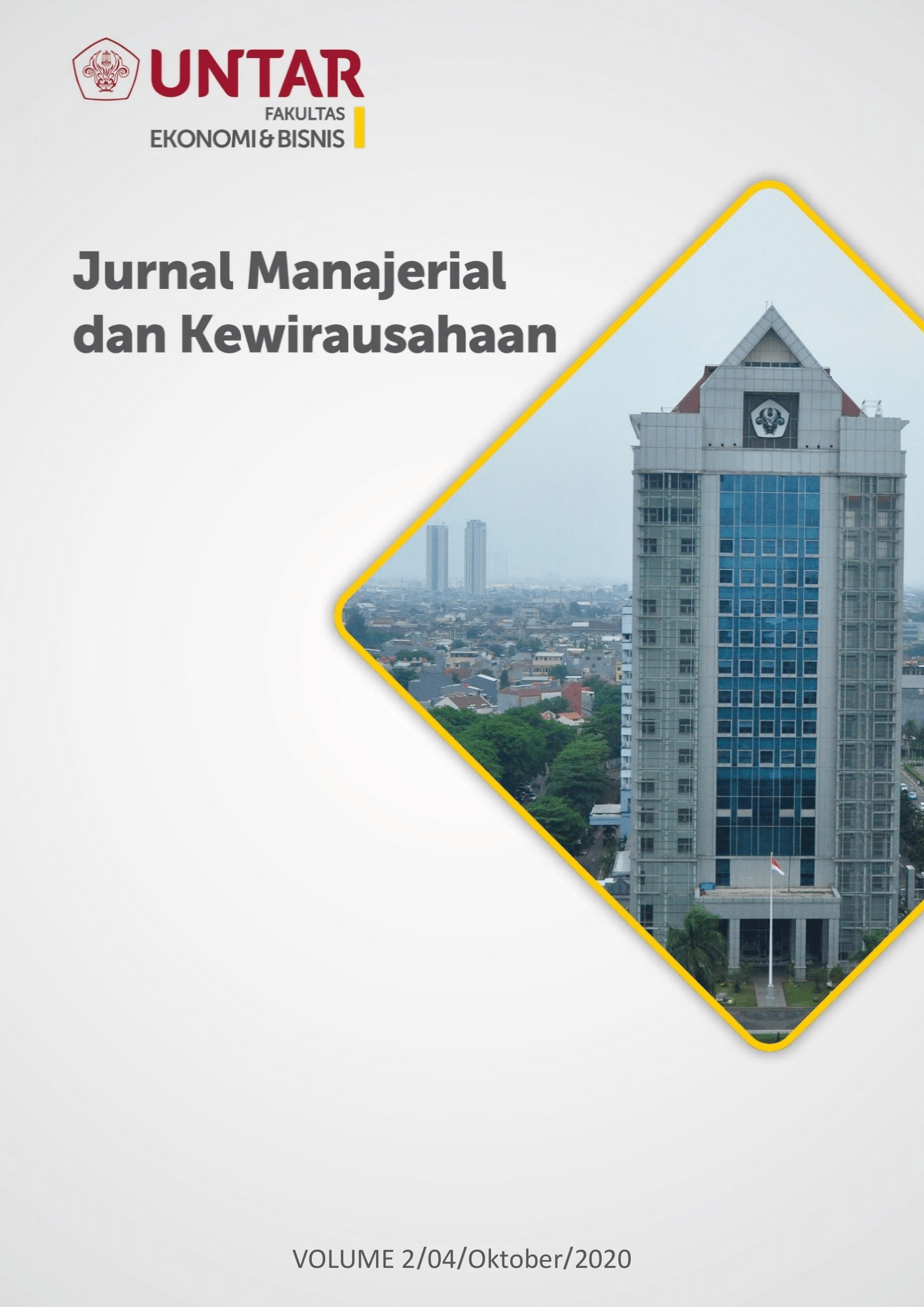Pengaruh Attitude, Subjective Norm dan Perceived Behavior Control terhadap Entrepreneurial Intention
Main Article Content
Abstract
The purpose of this research was to determine whether there is an influence of attitudes on entrepreneurial intentions, subjective norms on entrepreneurial intentions and perceived behavioral control on entrepreneurial intentions for Bachelor of Economics and Business Faculty of Tarumanagara University. The design used in this study is a casual type quantitative method, which is a simple research design that uses purposive sampling as the method and the researcher took a total sample of 150 respondents and this researcher used SmartPLS. The results of this study indicate that the attitudes and behavioral control perceived positive and significant influence on entrepreneurial intentions, but subjective norms do not affect entrepreneurial intentions for Bachelor of Economics and Business Faculty of Tarumanagara University.
Tujuan dari penelitian ini adalah untuk mengetahui apakah terdapat pengaruh sikap terhadap intensi berwirausaha, norma subyektif terhadap intensi berwirausaha dan kontrol perilaku yang dirasakan terhadap intensi berwirausaha bagi Sarjana Fakultas Ekonomi dan Bisnis Universitas Tarumanagara. Desain yang digunakan dalam penelitian ini adalah metode kuantitatif berjenis kasual, yang merupakan desain penelitian yang sederhana yang menggunakan purposive sampling sebagai metodenya dan peneliti mengambil jumlah sampel sebanyak 150 responden dan peneliti ini menggunakan SmartPLS. Hasil penelitian ini menunjukan bahwa sikap dan kontrol perilaku yang dirasakan berpengaruh postif dan signifikan terhadap intensi berwirausaha, akan tetapi norma subyektif tidak berpengaruh terhadap intensi berwirausaha bagi Sarjana Fakultas Ekonomi dan Bisnis Universitas Tarumanagara.
Article Details
Section
This work is licensed under a Jurnal Muara Ilmu Ekonomi dan Bisnis Creative Commons Attribution-ShareAlike 4.0 International License.,/p>
References
Aritonang, L. R. (2005). Kepuasan pelanggan. Jakarta: PT. Gramedia Pustaka Utama.
Ajzen, I. (1991). The theory of planned behavior. Organizational behavior and human decision processes, 50(2), 179-211.
BPS. (2019). Keadaan Angkatan Kerja di Indonesia (Retrieved from: www.bps.go.id/29-11- 2019).
Debarliev, S., Janeska-Iliev, A., Bozhinovska, T., & Viktorija, I. (2015). Antecedents of entrepreneurial intention: Evidence from Republic of Macedonia. Business and Economic Horizons (BEH), 11, 143-161.
Ferreira, J. J., Raposo, M. L., Rodrigues, R. G., Dinis, A., & Paço, A. D. (2012). A model of entrepreneurial intention: An application of the psychological and behavioral approaches. Journal of Small Business and Enterprise Development, 19(3), 424-440.
Kompas. (2017) Pemerintah Terus Motivasi Pemuda untuk Jadi Wirausahawan (Retrieved from: https://money.kompas.com/11-02-2017)
Liñán, F., & Chen, Y. W. (2006). Testing the entrepreneurial intention model on a two country sample. 6(7), 1-28
Liputan 6. (2020). Perkuat Mental Mahasiswa Penggiat Startup, Untar Gelar Entrepreneur Week (Retreived from: www.liputan6.com/28-01-2020)
Murugesan, R., & Jayavelu, R. (2015). Testing the impact of entrepreneurship education on business, engineering and arts and science students using the theory of planned behaviour. Journal of Entrepreneurship in Emerging Economies, 7(3), 256-275.
Mafabi, S., Nasiima, S., Muhimbise, E. M., Kasekende, F., & Nakiyonga, C. (2017). The mediation role of intention in knowledge sharing behavior. Vine Journal of Information and Knowledge Management Systems, 47(2), 172-193.
Muhammad, A. D., Aliyu, S., & Ahmed, S. (2015). Entrepreneurial Intention Among Nigerian University Students. American Journal of Business Education (AJBE), 8(4), 239-248.
Muthmainah & Cholil, M. (2015). Analysis of Attitude, Experience, Subjective Norm and Behavioral Control on The Entrepreneurial Intention and Behavior: A Case Study toward The Pawners of Sharia Pawnshop of Surakarta Branch Office, Central Java, Indonesia. International Journal of Information, Business and Management, 7(2), 63-76.
Nilsson, A., von Borgstede, C., & Biel, A. (2004). Willingness to accept climate change strategies: The effect of values and norms. Journal of environmental psychology, 24(3), 267-277.
Rachmawan, A., Lizar, A. A., & Mangundjaya, W. L. (2015). The role of parent's influence and self-efficacy on entrepreneurial intention. The journal of developing areas, 49, 417-430.
Solesvik, M. Z. (2012). Entrepreneurial motivations and intentions: investigating the role of education major. Investigating the Role of Education Major, 55, 253-271.
Sri Maryanti. (2017). Manajemen Usaha Kecil. Yogyakarta: Badan Penerbit Deepublish.
Sugiyono. (2012). Metode Penelitian Kuantitatif Kualitatif dan R&D. Bandung: Alfabeta.
Sugiyono. (2013). Metode Penelitian Pendidikan Pendekatan Kuantitatif, Kualitatif, dan R&D. Bandung: Alfabeta.
Thompson, E. R. (2009). Individual entrepreneurial intent: Construct clarification and development of an internationally reliable metric. Entrepreneurship theory and practice, 3(3), 669-694.
Warta Ekonomi. (2018). Jumlah Pengusaha Indonesia Masih Tertinggal dari Singapura (Retrieved from: www.wartaekonomi.co.id/26-11-2018).

